Diffusion of gasses - Study guides, Class notes & Summaries
Looking for the best study guides, study notes and summaries about Diffusion of gasses? On this page you'll find 163 study documents about Diffusion of gasses.
Page 4 out of 163 results
Sort by
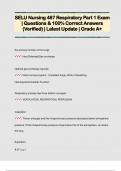
-
SELU Nursing 487 Respiratory Part 1 Exam | Questions & 100% Correct Answers (Verified) | Latest Update | Grade A+
- Exam (elaborations) • 24 pages • 2024
-
- $11.99
- + learn more
the primary function of the lungs : Host Defense&Gas exchange Optimal gas exchange requires: : Intact nervous system, .Compliant lungs, Work of breathing, Hemodynamic/Cardiac Function Respiratory process has three distinct concepts: : VENTILATION, RESPIRATION, PERFUSION Inspiration: : Thorax enlarges and the intrapulmonary pressure decreases below atmospheric pressure. If the intrapulmonary pressure drops below that of the atmosphere, air enters the lung Expiration: 2 | P a g e ...
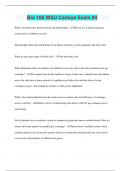
-
Bio 106 WSU Carloye Exam #4
- Exam (elaborations) • 9 pages • 2024
- Available in package deal
-
- $9.99
- + learn more
Bio 106 WSU Carloye Exam #4 What is the difference between blood and hemolymph? - Blood: In a Closed circulatory system and is confined to vessels. Hemolymph (AKA interstitial fluid): In an Open circulatory system and bathes the body cells. What are the major types of blood cells? - red and white cells What adaptations allow an animal to use diffusion across its skin as the only mechanism for gas exchange? - The animal must be thin and have a large surface area. Animals that only d...
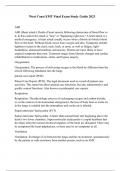
-
West Coast EMT Final Exam Study Guide 2023
- Exam (elaborations) • 86 pages • 2023
-
Available in package deal
-
- $12.00
- + learn more
AMI AMI (Heart attack): Death of heart muscle following obstruction of blood flow to it; in this context the attack is "new" or "happening right now." A heart attack is a medical emergency. A heart attack usually occurs when a blood clot blocks blood flow to the heart. Without blood, tissue loses oxygen and dies. Symptoms include tightness or pain in the chest, neck, back, or arms, as well as fatigue, lightheadedness, abnormal heartbeat, and anxiety. Women are more likely to have atypi...
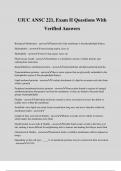
-
UIUC ANSC 221, Exam II Questions With Verified Answers
- Exam (elaborations) • 8 pages • 2024
- Available in package deal
-
- $11.49
- + learn more
UIUC ANSC 221, Exam II Questions With Verified Answers Biological Membranes - answerFramework of the membrane is the phospholipid bilayer Hydrophobic - answerwater fearing region, faces in Hydrophilic - answerwater living region, faces out Fluid-mosaic model - answermembrane is considered a mosaic of lipid, protein, and carbohydrate molecules Integral/Intrinsic membrane proteins - answertransmembrane and lipid-anchored proteins Transmembrane proteins - answerOne or more regions that are ...
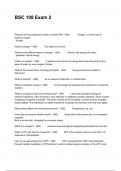
-
BSC 108 Exam 2 Questions And Answers
- Exam (elaborations) • 6 pages • 2024
-
Available in package deal
-
- $10.39
- + learn more
What do all living organisms need to sustain life? - ANS - Oxygen, or some way to produce oxygen - Energy What is energy? - ANS The ability to do work What are the different types of energy? - ANS - Kinetic- the energy of motion - potential- stored energy What is a calorie? - ANS A calorie is the amount of energy that raises the temp of one gram of water by once degree Celsius What is the conservation of energy principle? - ANS Ener...
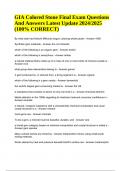
-
GIA Colored Stone Final Exam Questions And Answers, Latest Update 2024/2025 (100% CORRECT)
- Exam (elaborations) • 25 pages • 2024
-
- $14.99
- + learn more
By what date had Kokichi Mikimoto begun culturing whole pearls - Answer 1908 Synthetic gem materials - Answer Are not minerals which of the following is an organic gem - Answer amber which of the following is amorphous - Answer amber a natural material that's made up of a mass of one or more kinds of mineral crystals is - Answer rock what group does alamandine belong to - Answer garnet A gem produced by, or derived from, a living organism is - Answer organic which of the following is a ...
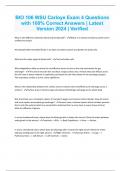
-
BIO 106 WSU Carloye Exam 4 Questions with 100% Correct Answers | Latest Version 2024 | Verified
- Exam (elaborations) • 6 pages • 2024
-
- $8.49
- + learn more
What is the difference between blood and hemolymph? - Blood: In a Closed circulatory system and is confined to vessels. Hemolymph (AKA interstitial fluid): In an Open circulatory system and bathes the body cells. What are the major types of blood cells? - red and white cells What adaptations allow an animal to use diffusion across its skin as the only mechanism for gas exchange? - The animal must be thin and have a large surface area. Animals that only diffuse across the skin have a dense ...
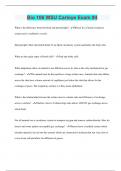
-
Bio 106 WSU Carloye Exam #4 | 2023 | 50 Questions with 100% Correct Answers | Updated & Verified
- Exam (elaborations) • 9 pages • 2023
- Available in package deal
-
- $11.49
- + learn more
What is the difference between blood and hemolymph? - Blood: In a Closed circulatory system and is confined to vessels. Hemolymph (AKA interstitial fluid): In an Open circulatory system and bathes the body cells. What are the major types of blood cells? - red and white cells What adaptations allow an animal to use diffusion across its skin as the only mechanism for gas exchange? - The animal must be thin and have a large surface area. Animals that only diffuse across the skin have a dense ...
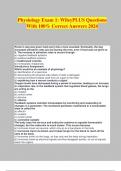
-
Physiology Exam 1: WileyPLUS Questions With 100% Correct Answers 2024
- Exam (elaborations) • 15 pages • 2024
- Available in package deal
-
- $12.49
- + learn more
Physiology Exam 1: WileyPLUS Questions With 100% Correct Answers 2024 Pavlov's dog was given food every time a tone sounded. Eventually, the dog increased salivation rates just by hearing the tone, even if food was not given to it. The increase is salivation rates is occurs through a) negative feedback systems b) positive feedback systems c) feedforward controls d) homeostatic imbalances Introductory Assignment Which would be an example of physiology? a) identification of a new bone ...
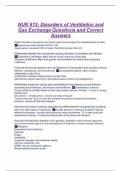
-
NUR 612- Disorders of Ventilation and Gas Exchange Questions and Correct Answers
- Exam (elaborations) • 3 pages • 2024
-
Available in package deal
-
- $8.49
- + learn more
Define the terms hypoxemia and hypercapnia and compare the manifestations of each. hypoxemia: when arterial PaO2 is <95. hypercapnia: increased CO2 in blood. PaCO2 is greater than 45. Differentiate between the mechanisms causing disorders of ventilation and diffusion. Disorders of ventilation affect how air move in and out of the lung. Disorders of diffusion affect how gasses move between the alveoli and pulmonary capillaries. Characterize the pathogenesis and manifestations of transudative...

That summary you just bought made someone very happy. Also get paid weekly? Sell your study resources on Stuvia! Discover all about earning on Stuvia


